Introduction
In an ever-evolving financial landscape, the role of Anti-Money Laundering (AML) consultants has become increasingly critical. These experts are tasked with fortifying financial compliance within organizations, ensuring that policies and procedures align with both local and international regulations. From conducting comprehensive evaluations to training staff in detecting money laundering activities, AML consultants play a pivotal role in safeguarding organizations against financial crimes.
This article delves into the key responsibilities of an AML consultant, the importance of establishing and maintaining compliance programs, and the benefits of engaging these specialists. Additionally, it explores the significance of effective risk assessment, documentation, and independent testing, providing a comprehensive overview of how AML consultants enhance organizational security and compliance.
Key Responsibilities of an AML Consultant
An Anti-Money Laundering (AML) consultant is pivotal in fortifying financial compliance within organizations. They perform thorough assessments of existing policies and procedures, identifying and reducing danger elements. Their role extends to recommending enhancements and ensuring adherence to both local and international regulations. For instance, BlueMonks, a Dutch anti-financial crime boutique, has significantly bolstered its Know Your Customer (KYC) operations to mitigate risks from suspicious activities, a move reflective of proactive AML measures.
Training staff to detect and counter potential money laundering activities is another critical responsibility. This is underscored by the rising number of AML breaches globally, with the United States alone witnessing over 11,472 incidents. Such training ensures that employees are well-equipped to maintain regulations and respond to threats effectively.
As highlighted by the Basel Committee, sound KYC policies are essential for the integrity and safety of banking systems. By implementing rigorous KYC frameworks, organizations can better protect themselves against financial fraud, enhancing their overall operational security.
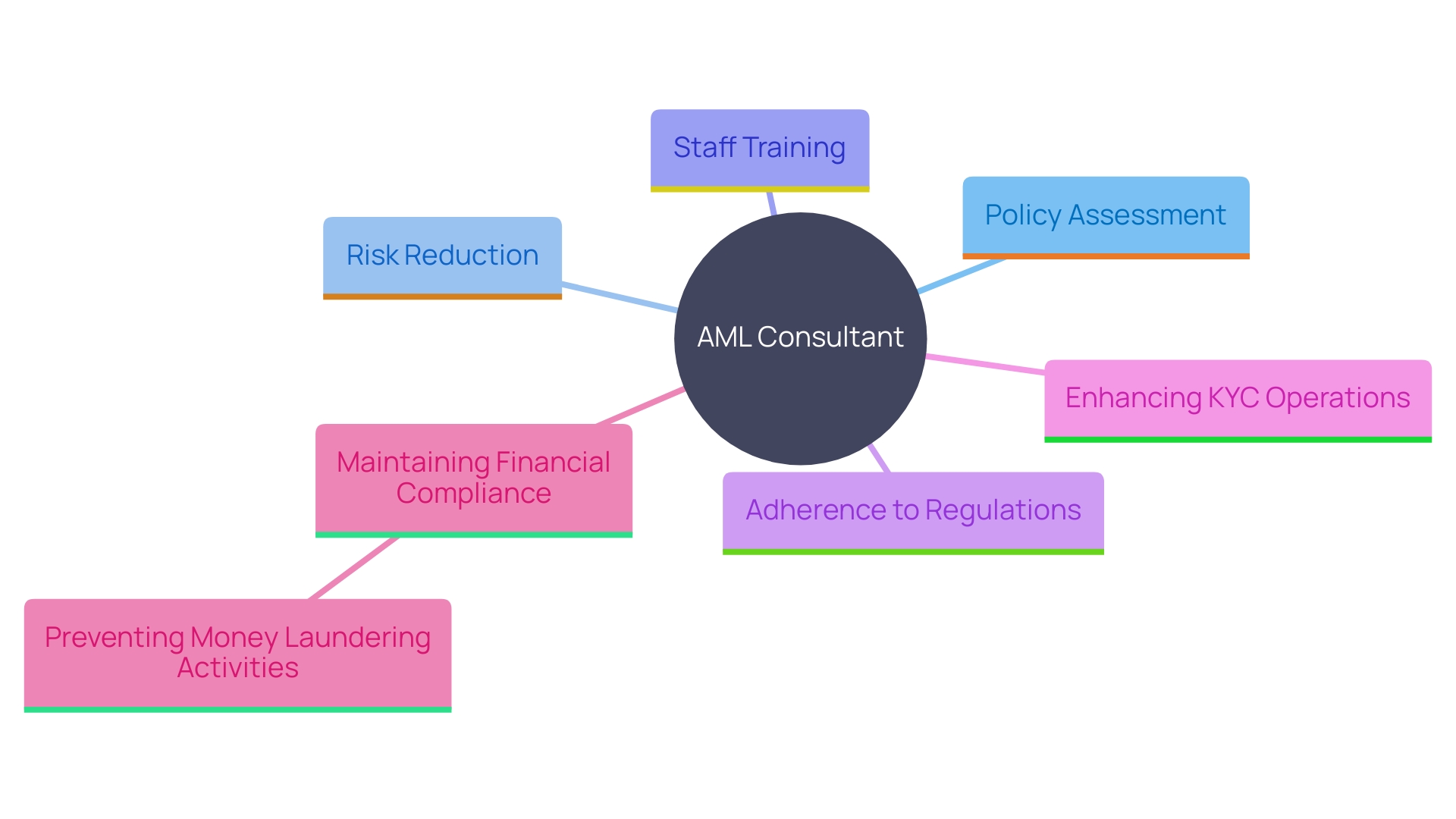
Establishing and Maintaining AML Compliance Programs
To establish an effective AML compliance program, consultants facilitate the development of robust policies that align with regulatory requirements. This involves creating a framework for continuous monitoring, risk assessments, and reporting mechanisms. According to Kristina French, CAMS, Financial Services Consulting, such programs must integrate regular updates to adhere to evolving regulations, ensuring the organization remains compliant while minimizing exposure to financial crimes. The Treasury’s eleventh annual report on AML/CTF supervision highlights the importance of transparency and accountability among supervisors, further emphasizing the necessity of these updates. Enforcement data indicates significant alterations in supervisory activity, with penalties assessed highlighting the essential requirement for careful adherence efforts.
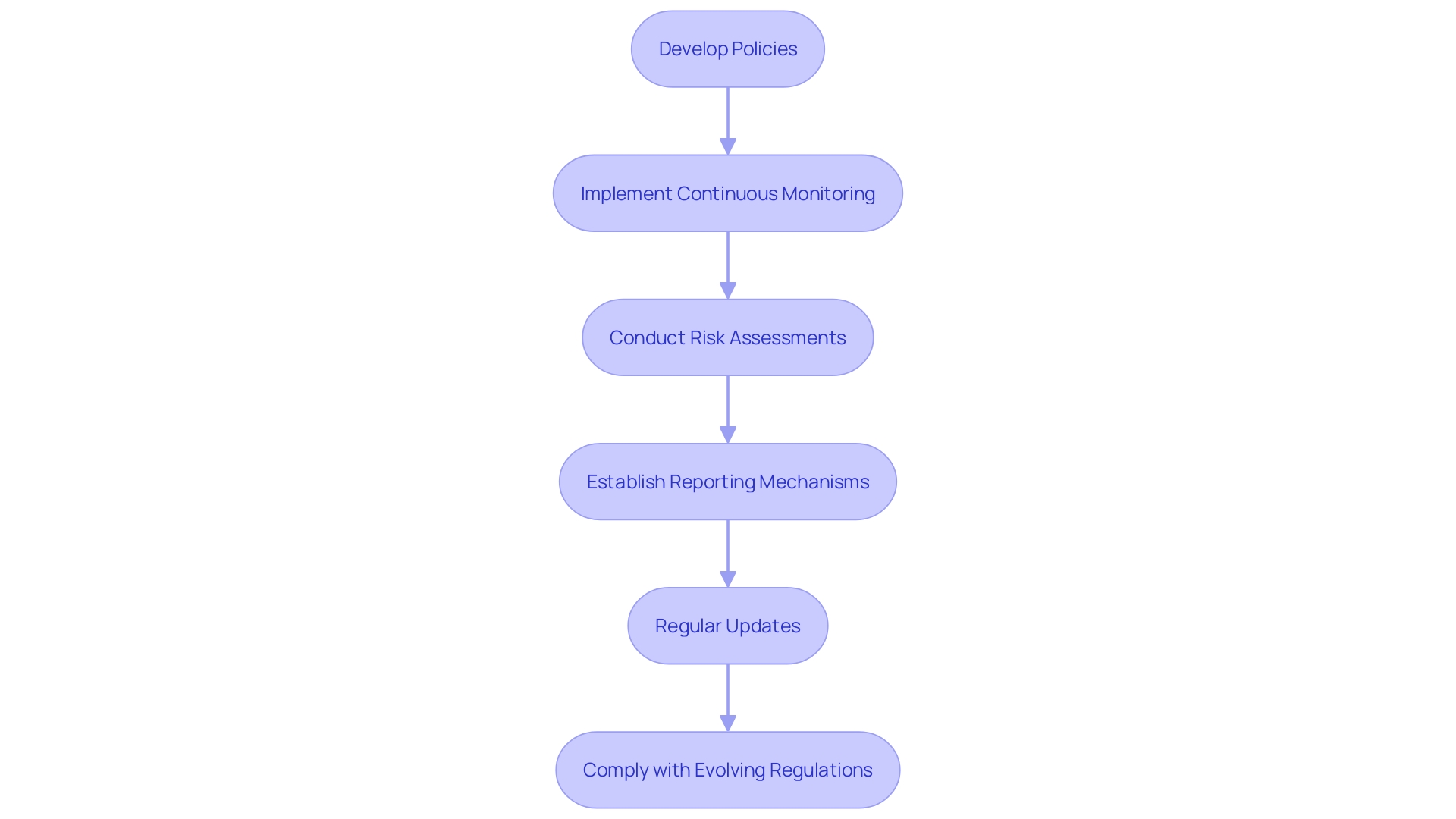
Risk Assessment and Management in AML Compliance
Efficient evaluation of potential threats is a cornerstone of Anti-Money Laundering (AML) compliance. By employing systematic methodologies, consultants can identify operational vulnerabilities and evaluate the potential consequences of various threats. This proactive method enables entities to prioritize resources and apply measures that reduce threats linked to money laundering and financial offenses.
To achieve this, organizations should focus on their most significant threats. These prioritized threats become the focal point of management efforts, which include continuous audits and monitoring. Employing a range of instruments to track threats in real-time is crucial. Furthermore, offering staff with comprehensive training guarantees that they are well-prepared to protect against these threats, maintaining key messages current and prominent.
Developing a control summary for potential issues is essential. This document succinctly outlines the nature of the hazard and the actions taken to mitigate it. Significantly, threat assessment and evaluation should guide the compliance program, rather than the opposite. According to the NIST Risk Management Framework, the potential threat can be estimated as a multiplicative measure of an event’s probability of occurring multiplied by the magnitude of its consequences. Always remember that evaluation of potential issues is a human-centric activity requiring organization-wide efforts, including the involvement of all relevant stakeholders.
Statistics indicate that AML adherence failures have resulted in substantial fines. For example, recent Financial Times analysis revealed 11 fines in one year, compared to an average of less than two per year over the last five years. These failures often arise from institutions not registering as money-transmitting businesses or breaching the International Emergency Economic Powers Act (IEEPA), emphasizing the critical importance of strong risk assessment and adherence strategies.
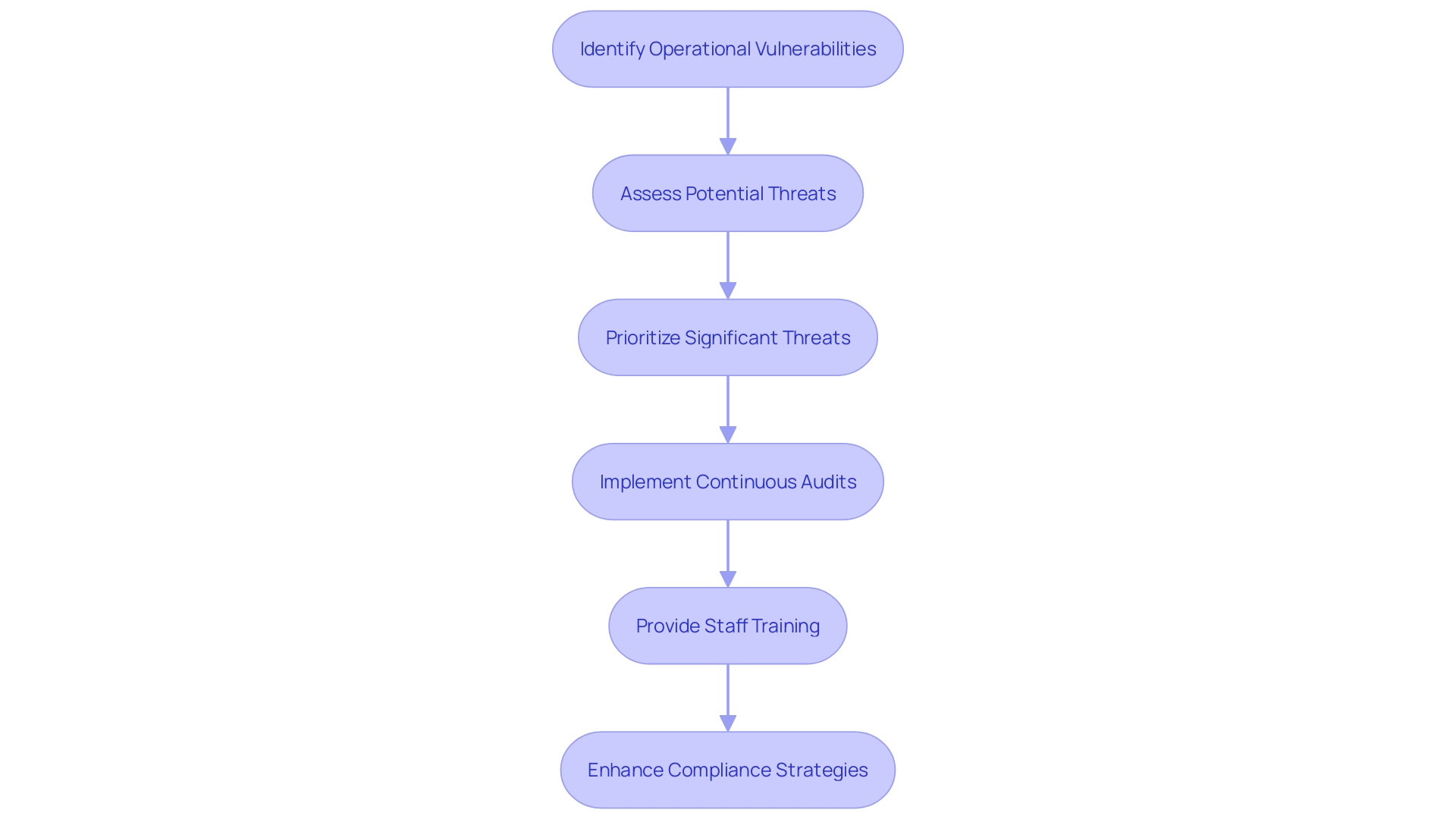
Benefits of Hiring an AML Consultant
Hiring an AML consultant provides numerous advantages that can greatly improve a company's compliance framework. These experts provide in-depth guidance on navigating complex regulations, ensuring that policies are not only comprehensive but also customized to the specific needs of the entity. This customization is critical as it aligns with the entity's operational dynamics and risk profile.
Moreover, AML consultants play a vital role in developing and implementing advanced staff training programs. These programs are designed to keep staff informed and vigilant about the latest compliance requirements and threat landscapes. Through continuous learning and adaptation, employees can stay ahead of evolving threats, thus strengthening the overall defense mechanisms of the entity.
The consultants' extensive experience in identifying suspicious activities and conducting thorough investigations is another invaluable asset. Their expertise results in enhanced detection rates of potential money laundering activities and a notable decrease in the likelihood of regulatory penalties. This proactive strategy not only protects the entity against financial crimes but also guarantees adherence to strict regulatory standards, which is essential in today's rapidly evolving financial sector.
In light of the rapid technological advancements, especially in Regulatory Technology (RegTech) involving Machine Learning (ML) and Artificial Intelligence (AI), the role of AML consultants becomes even more pivotal. These technologies offer both challenges and notable benefits in forecasting issues and guaranteeing adherence. Collaborative efforts among financial institutions, regulators, and tech companies are essential to harness the full potential of these innovations.
By utilizing the knowledge of AML advisors, entities can effectively manage the intricacies of regulations, reduce risks, and establish a strong and flexible AML framework.
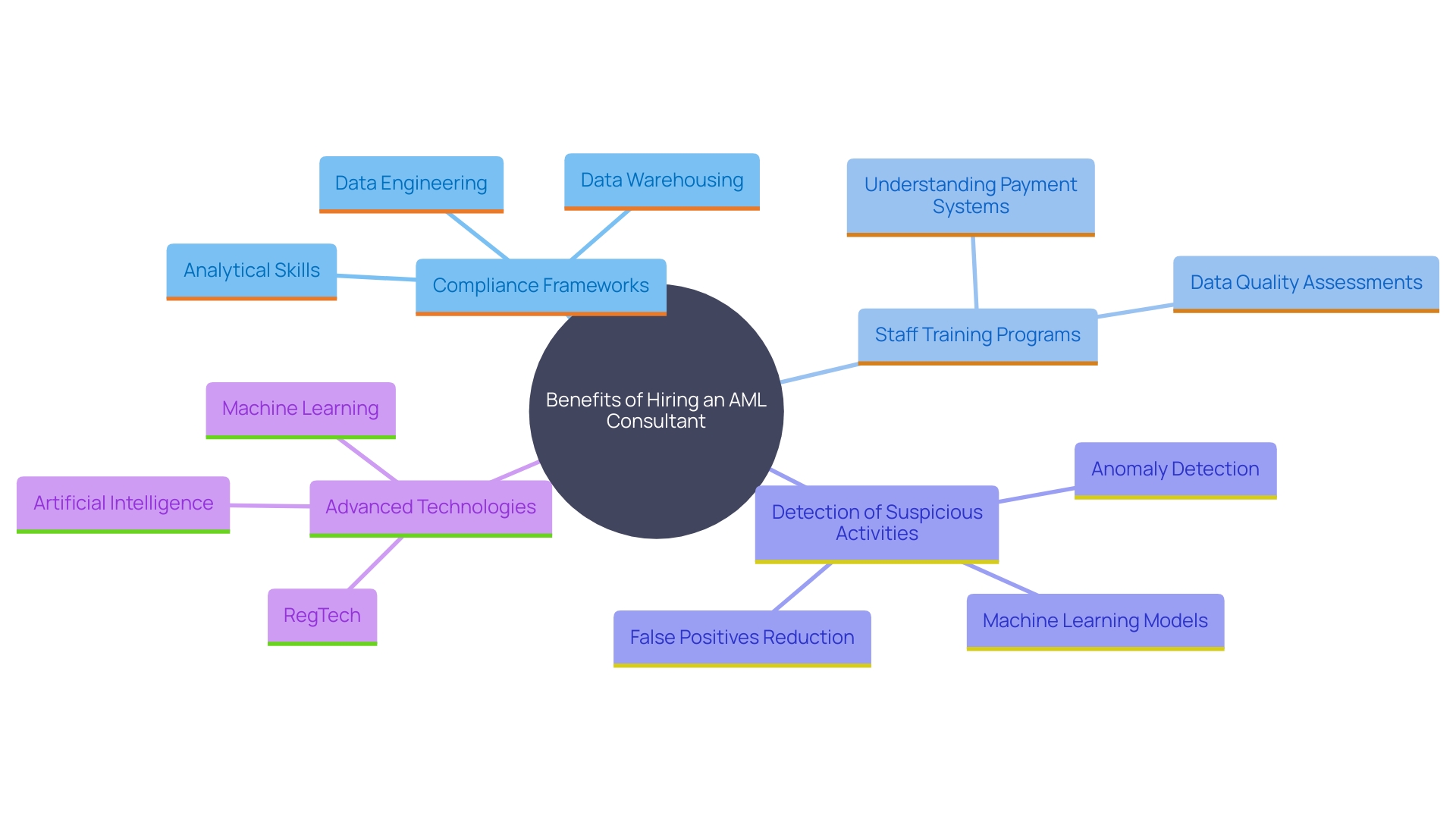
Documentation and Record Keeping for AML Compliance
Effective documentation and meticulous record-keeping are critical for adhering to anti-money laundering (AML) regulations. Consultants play a crucial role in assisting businesses in creating extensive systems for monitoring transactions, protecting client records, and outlining adherence initiatives. Such robust practices not only streamline regulatory inspections but also significantly bolster the organization’s ability to adeptly respond to inquiries and audits.
This alignment with regulatory requirements ensures that all relevant data, such as transaction details and client information, are readily accessible and systematically organized. The implementation of these systems often includes advanced reporting mechanisms, such as the FinCEN e-filing system for Suspicious Activity Reports (SARs), which is crucial for timely and accurate reporting of potential money laundering activities.
Furthermore, the organized method for documentation and record-keeping, which involves classifying records into more than 30 categories and identifying politically exposed persons (PEPs), improves the overall integrity and efficiency of regulatory operations. This systematic approach, supported by credentials such as ISAE 3000 Type 2, highlights the significance of precision and legitimacy in sanctions research and adherence workflows.
Integrating these best practices not only fulfills regulatory standards but also reduces risks, offering a strong defense against financial crimes and promoting a culture of transparency and accountability within the entity.
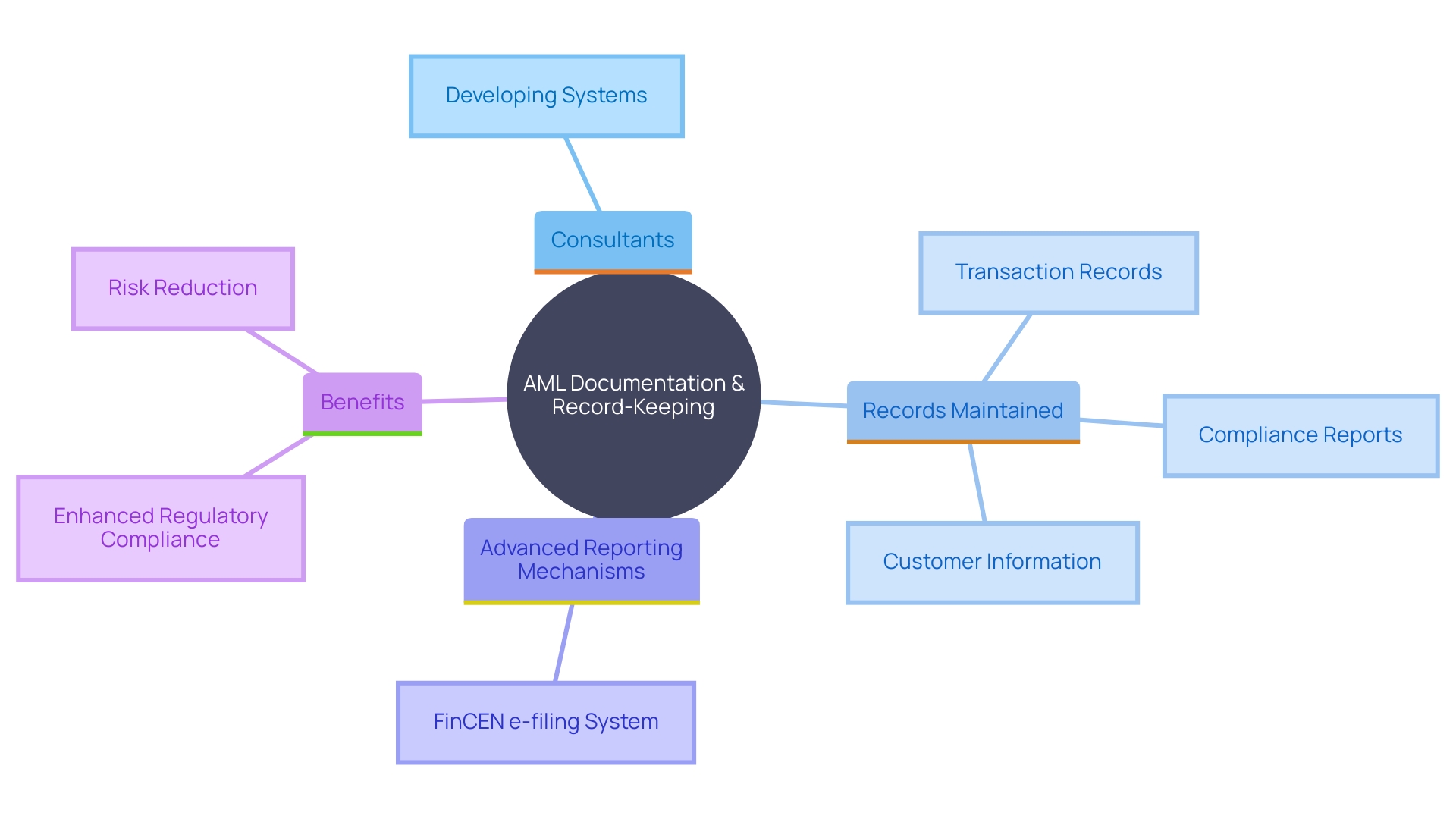
Independent Testing and Review of AML Compliance
Performing routine independent evaluations of anti-money laundering (AML) adherence programs is crucial for guaranteeing their effectiveness. Consultants play a crucial role in evaluating these programs, identifying gaps, and recommending corrective actions. This continuous review process not only improves adherence to regulations but also promotes a culture of accountability within the organization, highlighting the significance of following AML guidelines. As stated by the Center for Industry Self-Regulation, industry self-regulation frequently entails companies following voluntary legal, ethical, or safety standards, often utilizing an independent third party as a monitoring entity. This method is particularly effective in addressing emerging issues and building robust accountability programs. Additionally, the Joint Commission Journal on Quality and Patient Safety emphasizes the importance of innovative thinking and practices in improving quality and safety, which is equally applicable to AML compliance. Regular evaluations and independent testing are pivotal in continually improving these programs, ensuring they meet the required standards and effectively mitigate risks.
Conclusion
The role of Anti-Money Laundering (AML) consultants is vital in today’s financial landscape. These experts conduct thorough evaluations of compliance frameworks, implement rigorous Know Your Customer (KYC) policies, and provide essential training to staff, ensuring organizations are equipped to detect and respond to money laundering activities.
Establishing effective AML compliance programs is crucial. Consultants assist in creating robust policies that adapt to evolving regulations, minimizing exposure to risks. Their skills in systematic risk assessments enable organizations to identify vulnerabilities and allocate resources effectively, fostering a proactive compliance approach.
The benefits of engaging AML consultants extend to tailored guidance and advanced training, enhancing staff awareness of emerging threats. The integration of innovative technologies, such as Machine Learning and Artificial Intelligence, further strengthens compliance efforts, allowing organizations to navigate regulatory complexities more efficiently.
Additionally, meticulous documentation and independent testing are essential for maintaining compliance. By implementing robust record-keeping systems and conducting regular evaluations, organizations ensure transparency and accountability in their compliance strategies.
In conclusion, leveraging AML consultants is critical for organizations seeking to enhance compliance frameworks and mitigate risks associated with financial crimes. By prioritizing these initiatives, organizations can protect their operations and maintain stakeholder trust in an increasingly regulated financial environment.




